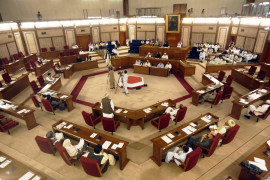
A three-judge bench, headed by Chief Justice Iftikhar Muhammad Chaudhry, was hearing identical petitions against the Balochistan government’s decision to lease out gold and copper mines in Reko Diq in Chagai district to foreign companies.
Khalid Anwar, the counsel for Tethyan Copper Company Pakistan (TCCP), asked why the BHP and the provincial government entered into a new agreement in 2000 over the Reko Diq mining lease when an original agreement, known as CHEVJA, had already been signed with the BHP in 1993 – this agreement was eventually bought by the TCC.

“Our interest is ensuring transparency in terms of law,” remarked Justice Chaudhry. “We do not go into issues pertaining to the transaction agreement between the parties. But we look into whether the agreements are valid,” he added.
Anwar also informed the court that as many as 10 prospecting licences were issued to the BHP while the TCCP had spent millions of dollars on compiling a project feasibility report – which would go to waste if the agreement with the TCCP was cancelled.
He also pleaded that no proficient engineer was available in Pakistan to handle the Reko Diq mining lease operation so his client had paid a huge amount of money to foreign engineers.

Justice Gulzar Ahmed pointed out that the agreement has been signed by the BDA, not by the Pakistan government. Anwar responded that many agreements are signed by either a section officer or a deputy secretary on behalf of the government and the BDA was authorised by the then provincial governor to do so in accordance with the law.
The chief justice replied that the agreement was made under the instructions of such a senior provincial functionary, but there was no mention of a date on the agreement and the governor cannot issue such directives to sign any addendum.
“Tell us the importance of this agreement under Pakistani law. We also need the validity of every document in this agreement,” Justice Chaudhry remarked. The bench asked Khalid Anwar to complete his arguments and adjourned the hearing of the case till today (Wednesday).
Published in The Express Tribune, November 28th, 2012.
COMMENTS (3)
Comments are moderated and generally will be posted if they are on-topic and not abusive.
For more information, please see our Comments FAQ

















@AQILKHAN: Thank you sir for enlightening us. Without your elaboration we would have been blind on this issue. Hope you all the best.
T.C.C. was given license only for geological estimation of Reko-Diq copper-gold reserves which has been completed. While they do not have mining and ore processing rights for which they insisted in the Supreme Court.
T.C.C started itself preparing the lucrative feasibility report for which they were not asked.
Previous T. C.C. lucrative investment offer was based on mining and production of Copper Concentrate (28% pure Copper ore) which they wanted to carry via pipe line to Gawader port for exporting to smelters and refiners of the developed countries like USA, JAPAN, CHILE etc., where it were to be utilized to produce value added products (e.g. future extensive use of 99.99% pure Copper will be in the manufacturing of various components of hybrid motor vehicles).
Also the above T.C.C scheme of carrying the Concentrate to Gawader port, would have caused severe shortage of drinking and agricultural water in the already arid Balochistan and also unrecoverable environmental problems at Gawader Port which was also the violation of the international environmental law ( any scheme of depriving a nation from basic need of drinking and agricultural water, is challengeable in international court).
Any prospective investment offer should be based on setting the following steps wise integrated Copper mining and manufacturing Plants at mine mouth so that youth of the province could get maximum sustainable jobs and a rational share of the province to get maximum economic benefits of the resources.
Video -I Comprising of Mining, Grinding and Floatation process to produce Copper concentrate. http://www.youtube.com/watch?v=ZjaUX4kDUSw
Video-II Comprising of Smelting, Converting, Anode refining and 99.99% LME A-grade copper Cathode production. http://www.youtube.com/watch?v=4wZumvsqV1w
Acquiring the capability of producing 99.99% LME Grade pure Copper , would provide further opportunities to set the Copper based downstream industries in the country for a market of 180 millions Pakistanis and also for exports as shown below.
Video-III Comprising of few examples of downstream industries in India, Pakistan and worldwide. http://www.youtube.com/watch?v=nDVfmKsRgOA
The purpose of preparing videos (an extract of 80 videos) of steps wise Copper production by myself, was an attempt to demonstrate and make the Pakistanis understand how the Contractor’s lucrative investment scheme would have caused multi loses to Pakistanis which are once again summarized below.
-Depriving Pakistanis of acquiring a capability of becoming a self sufficient Industrial nation.
-Lose of thousands of Jobs and revenue generated by downstream industries.
As there is no surface water available in Chagai, Kharan and surroumding areas of Balochistan, so the fresh drinking and agricultural water is obtained from earthen or Karez, underground water channels connected to open well system making the life sustainable. So any misuse of fresh water like scheme proposed by the contractor T.C.C. ,will create a worse draft of fresh water available in the area rapidly, in forth coming years.
Instead of recycling of fresh water as the reputed mining companies do, T.C.C scheme is to continuously pump the underground fresh water and mixed with the ore to produce 28% Copper concentrate and waste in carrying the slurry bearing copper concentrate via pipe line from Reko Diq to Gawader port, where the ore was to be separated and the polluted water bearing metal tailings and chemicals, will be drained in coastal areas of Gawader port which would result in polluting the coastal waters, destroying marine livelihood resources such as fish and shrimp and the fishing business in forth coming years.
Now that's a case to track! I'm glad CJ is working now on issues that really set the standard of business contracts done by provinces which are independent of the involvement the Center.